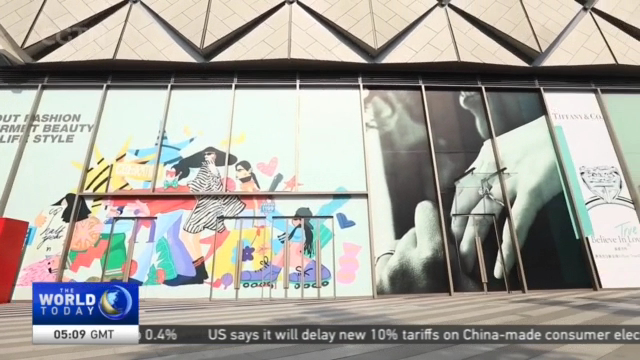
13:34, 14-Aug-2019
China's Retail Sales: Cities aim to boost first-store economies
Updated
14:47, 14-Aug-2019

New retail sales data shows an expansion of Chinese people's consumption demand. The key, in many of the nation's big cities, may be an up-and-coming draw, called the first-store economy. CGTN's Xu Xinchen explains.
Choosing your next vehicle is not the only feature offered by Chinese high-end electric car maker, NIO.
The carmaker's showroom, NIO House, is also a place for coffee and group outings.
And NIO House first opened in Chengdu last fall, the brand's first showroom in the city, and the first in Southwestern China.
LIU CHENGJUN HEAD OF SERVICE OPERATION, NIO CHENGDU "Chengdu ranks sixth nationwide for new car deliveries. Until this June, NIO has delivered over 18,000 across the country and some 1,000 are in Chengdu."
As a start-up, NIO is often considered China's Tesla, rolling out its first consumer car about two years ago.
The cars' local popularity was the main reason behind NIO House's opening, and another reason, the city wants the brand to come as Chengdu hopes to boost its so-called "first-store economy".
And malls across the city now aim at brands that have never come before.
XU XINCHEN CHENGDU "Look at that giant Panda climbing on the mall. It has become a familiar sight in Chengdu's hottest commercial center — Chunxi Road. And over one third of store brands in that mall — one of the busiest and most high-end in the city — can be classified as 'first-store'— a brand's first store in the city and even in Southwest China."
Yet, opening new stores are just the first step.
CHU DAN HEAD OF RETAIL, JLL WEST CHINA "The concept of a 'first-store economy' is more about things behind store-openings that boost local consumption. We can understand it as the first stores stimulate people's desires and demands."
The idea was first tried in Shanghai last year, and Chengdu soon followed suit.
CHU DAN HEAD OF RETAIL, JLL WEST CHINA "Chengdu rolled out its own policies to develop first-store economies in April. It, of course, follows Shanghai's big lead to attract international and reputable brands to set up flagship stores that can be considered first in the region. In addition, the city also encourages locals to build their own signature shops that can potentially migrate to other cities."
Incentives are also offered to brands first entering the city. Chu says the amount is not huge, but serves as a great gesture for Chengdu's welcoming attitude for businesses to come.
While brands are encouraged, they are advised to think about their own competitiveness.
LIU CHENGJUN HEAD OF SERVICE OPERATION, NIO CHENGDU "A first-store economy is a creative and an important tool to tap into commercial potential. But the core still comes down to product and service qualities."
Chengdu attracted over 200 first-stores in the first six months of the year — only Shanghai and Beijing had more.
Prospects are even brighter for the second half of 2019. However, experts say brands should learn local markets first and pace themselves accordingly. Xu Xinchen, CGTN, Chengdu.
SITEMAP
Copyright © 2018 CGTN. Beijing ICP prepared NO.16065310-3
Copyright © 2018 CGTN. Beijing ICP prepared NO.16065310-3